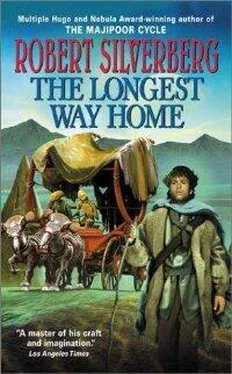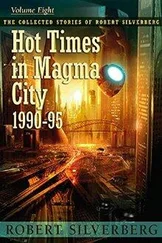But it was impossible for Joseph to say any of that to her. How could he let this girl—this woman, really—for whom he now felt such desire, such need, such love, even, and from whom he had received such delights and hoped to receive more, think that he looked upon her not as a human being but as a kind of domesticated beast? Not only would telling her that be a hideous impossible insult, but he knew it was not even true. Everything about her demonstrated that. Everything he had seen about Eysar Haven demonstrated that. These people were quite capable of functioning on their own. And perhaps that had been true of all the other Folk, too, once upon a time, back before the Conquest.
It was clear to him now that the Conquest had been a conquest indeed, in fact as well as name. The Folk had been doing well enough before the first Masters came to Homeworld. They lacked the force and drive of Masters, perhaps, but was that a sin? Had they deserved to lose control of their own lives, their own world, for such failings? The Masters had subjugated the Folk. There was no other applicable word. Even if the bloody rebellion that had driven Joseph himself into these wanderings across the face of the continent of Manza had not taught him by now how resentful of Master rule the Folk were, or some of them, anyway, this stay in Eysar Haven and these late-night conversations with Thayle would have shown him that. It all seemed obvious enough to him now; but it was devastating to him to be forced to see how much he had simply taken for granted, he with his fine Master mind, his keen, searching intellect.
She challenged him in other areas, too.
“Your father, the Master of House Keilloran—how did he get to be the Master of the House?” She still could not pronounce the name correctly, but Joseph let that go. “Did everybody who lives there choose him for that?”
“His father was Master of the House before him,” Joseph told her. “And his father before that, going back to the beginning. The eldest son inherits the title.”
“That’s all?” Thayle said. “He is allowed to govern thousands and thousands of people, Masters and Folk alike, simply because he’s his father’s son? How strange. It seems very foolish to me. Suppose there’s someone else better suited to govern, somebody who’s smarter and wiser and more capable in every way. Everyone can see that, but he won’t be allowed, will he? Because he’s not the eldest son of the eldest son. That’s a stupid system, I think.” Joseph said nothing, and Thayle was silent a moment, too. Then she said, “What happens if there’s more than one son? That wouldn’t be very unusual, would it?”
“The eldest son always inherits.”
“Even if the second or even third son is plainly better qualified. Or the second or third daughter , for that matter. But I suppose daughters don’t figure into this.”
“Only the eldest son,” Joseph said. “He’s specially trained for the job from childhood on. Since it’s known that he’s going to inherit, they see to it that he’s been properly taught to do what must be done.”
“But no matter how well they teach him, he isn’t necessarily the smartest member of his family, is he? Even if it is agreed that you have to limit the title to a single family just because that family happens to have grabbed power first, you could have generation after generation where the new Master isn’t even the best qualified person among his own people. Do you think that’s so good, Joseph?”
This is a girl of the Folk who is asking me these questions, he said to himself. This is a docile, ignorant creature, a peasant, a person incapable of serious thought.
There was another long silence.
Thayle said then, “Are you the eldest son, Joseph?”
“Yes. Yes, I am.”
“You will inherit the title, then, and be Master of House Keilloran. By right of birth alone, nothing else.”
“If I live to get home, yes. Otherwise my brother Rickard will be. He won’t like that, if things happen that way. He never expected to rule and he’s not well prepared for doing it.”
“But he’ll become the Master anyway, because he’ll be the eldest available son.”
“Yes. Yes.”
“By right of birth alone. Not necessarily because he’ll be a good Master.”
He wished she would stop pounding at him. “Rickard will be a good Master if the title comes to him,” Joseph said stubbornly. “I’m sure that he will. I know that he will.” But he could not hide the lack of conviction in his voice. He was amazed at how, within the space of fifteen minutes, Thayle had undermined every assumption he had ever held about the relationship of Master to Folk, about the method by which the Great Houses chose their leaders, about the merit of his own automatic succession to the powers of head of the House. He felt as though this bed on which the two of them were lying had turned somehow into a flimsy raft, on which he was being borne down some turbulent river toward a steep cataract that lay only a short distance ahead.
Joseph let the silence stretch and stretch until it was nearing the breaking-point, but still he could not bring himself to speak. Whatever he might say would be wrong.
“Are you angry with me?” Thayle asked him finally.
“No. Of course I’m not.”
“I’ve offended you. You thought I was criticizing you.”
“You have a different way of looking at things, that’s all. I was just thinking about everything you said.”
“Don’t think too much. Not now.” She reached across to him. Gratefully he surrendered to her embrace. They began to move in the way that was already beginning to become familiar to them. Joseph was glad to be able to lose himself in the unthinking pleasures that her supple body offered.
The next morning after breakfast, the hour when nearly everyone had gone off to the day’s work in the fields and Joseph was alone in the house, he was startled to hear her voice, calling to him from outside, a low, sharp whisper: “ Joseph! Joseph!”
That surprised him, that she should be calling him by his real name. But at this time of the day there was no one around but old people and small children to hear her do it.
And the fact of Thayle’s presence here at this time of day made his heart leap. She must have sneaked back from the fields so that they could be together. It was exciting to think that she would want him that much. And there was another thing: they had never made love by daylight. That would be something new, different, wonderful, a revelation.
He rushed out onto the porch to greet her and lead her to his bedroom.
But then he saw her. How she looked. “Thayle?” he said, in a small, bewildered voice. “What happened, Thayle? Was there an accident?”
“Oh, Joseph—oh—oh, Joseph—”
She looked horrifying. Her clothing was torn and dirty. One sleeve dangled by threads. Thayle herself looked bruised and hurt. Her lower lip had a bloody cut on it and it was beginning to turn puffy. Another narrow trail of blood ran down from one of her nostrils. Her left eye was swelling shut. She held her hand pressed to her cheek: that seemed to be swelling up also. One of her sandals was missing. Her expression was a strange one: blank, frozen, dazed.
Joseph gathered her in without asking questions, held her close against himself, gently stroked her back and shoulders. She began to sob quietly. For a few moments she accepted the comfort he was offering her, and then she pulled back from him, looking up into his eyes, searching for words. “You have to leave,” she said. “Right now. There’s no time to waste.”
“But what—what—?”
“Grovin. He knows. He was hiding outside your window last night. He heard us . . . everything.”
Читать дальше












